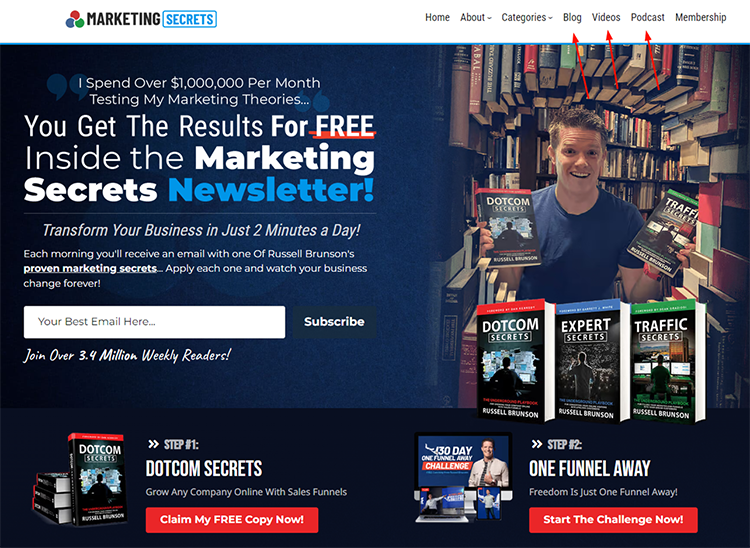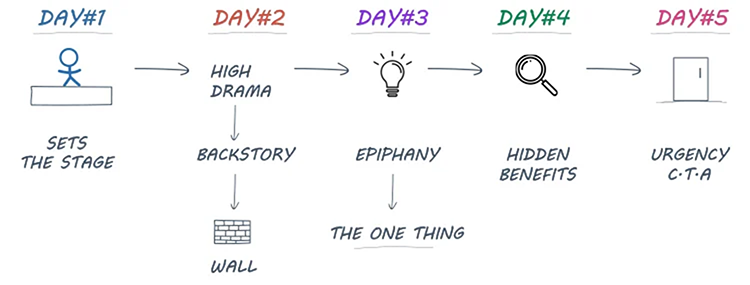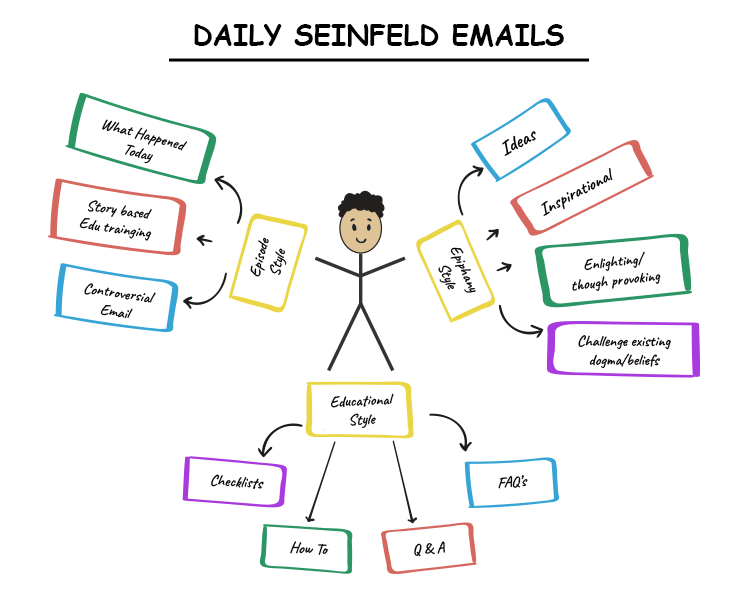Starting a business is exciting, but getting it noticed?
That’s the real challenge.
Effective marketing can make or break your startup. But don’t worry — we’ve got your back.
In this article, we’ll explore 6 killer tactics to skyrocket your startup’s visibility and growth. From understanding your audience to leveraging cutting-edge digital strategies, these tips will help you stand out and connect with potential customers.
Ready to supercharge your startup’s marketing? Let’s dive in!
Tip #1: Understand Your Target Audience
You’ve got a great product or service, but do you know who it’s for?
Understanding your target audience is like having a secret weapon in your marketing arsenal. It’s not just about knowing their age or location — it’s about diving deep into their world.
You want to know them better than they know themselves.
Think about it: What keeps your ideal customer up at night? What are their dreams, fears, and frustrations? When you truly understand your audience, you can speak their language and offer solutions that resonate on a personal level.
Here’s how to get started:
Create a Detailed Buyer Persona
Imagine your ideal customer. Give them a name, a job, hobbies, and challenges. The more specific, the better. For example, “Tech-Savvy Tom” might be a 35-year-old software developer who struggles with work-life balance and loves trying new productivity apps.
- Interview a friend who fits your ideal customer profile
- Create a “day in the life” storyboard for your persona
- Role-play as your persona in a team meeting

Conduct Surveys and Interviews
Don’t just guess what your audience wants — ask them! Use tools like SurveyMonkey or even simple Google Forms to gather insights. Better yet, hop on calls with potential customers. Their words are gold for your marketing efforts.
- Call 10 past customers and spend 20 minutes chatting with them
- Host a virtual “coffee break” with potential customers
- Create a quick poll on your Instagram or LinkedIn story
Analyze Your Competition
Check out what your competitors are doing. Who are they targeting? What pain points are they addressing? This can give you valuable insights and help you find gaps in the market.
- Sign up for your top 3 competitors’ email lists
- Attend a competitor’s webinar or event as a “secret shopper”
- Analyze the top 5 reviews of your competitors’ products
Use Social Media Listening
Platforms like Twitter, Reddit, and industry forums are treasure troves of information. See what conversations your potential customers are having. What problems are they discussing? What solutions are they seeking?
- Spend an hour in relevant Facebook Groups, noting common questions
- Set up Google Alerts for key industry terms and customer pain points
- Join a Twitter chat related to your industry
Bonus Tip: Identify Your Place Among the “Three Markets”
Virtually all products fall somewhere into these three markets: health, wealth, and relationships. Niche down two more levels to identify your unique place in the market and discover exactly who you serve.
Here’s one example for each market path…
- Health —> Weight Loss —> Personalized Meal Planning
- Wealth —> Finance —> Paying Off Debt
- Relationships —> Love —> Going Through Divorce

Understanding your audience isn’t a one-and-done deal.
It’s an ongoing process. As your startup grows and evolves, so will your audience. Keep listening, keep learning, and keep refining your approach.
By truly understanding your target audience, you’ll be able to create marketing messages that hit home, develop products that solve real problems, and build a loyal customer base that will help your startup thrive.
Tip #2: Create an Attractive Character
Ever wonder why some brands just click with their audience? It’s not just about what they’re selling — it’s about who’s doing the selling.
Enter the “Attractive Character” — your secret weapon for connecting with your target market.
What’s an Attractive Character, you ask? It’s not about looks, but about relatability. It’s a persona that embodies your brand and resonates with your audience.
Think Flo from Progressive or the Geico Gecko. These characters make us feel something, and that’s exactly what you want for your startup.

Here are three quick ways to bring your Attractive Character to life:
Choose Your Character Type
When it comes to a character of a story, there are three main archetypes you can choose from…
- The Leader: Be the Tony Robbins of your industry
- The Adventurer: Channel your inner Alex Hormozi and showcase your journey
- The Reluctant Hero: Share your humble beginnings and surprising success (like Russell Brunson!)
Craft a Compelling Backstory
Here’s a great example of a backstory we created for ClickFunnels and posted a few years ago.
- Write a 5-minute “origin story” for your character
- Identify 3 key turning points in their journey
- Share a relatable struggle they’ve overcome
Integrate Your Character Everywhere
Once you’ve created your attractive character, you want your target market to start seeing them everywhere. On your social pages. On your YouTube channel. In your emails. The more they see them and hear from them, the more they’re going to connect with them.
- Create a signature email sign-off that reflects their personality
- Design a cartoon avatar for social media profiles
- Record a short video introducing your character to your audience
Remember, your Attractive Character is the face of your brand. They’re not just selling a product — they’re sharing a story, a journey, and a vision that your audience can connect with.
Remember Colonel Sanders…

Or the Old Spice Guy…

Or Steve Jobs…

That’s what you’re trying to do 🙂
Tip #3: Leverage Content Marketing
Content is king — and for startups, it’s your secret weapon.
Content marketing isn’t just about churning out blog posts; it’s about providing value, building trust, and positioning your startup as an industry leader.
Plus, it’s a fantastic way to showcase your newly created Attractive Character!
Here’s how you can leverage content marketing to skyrocket your startup’s visibility:
Diversify Your Content Types

Your audience consumes information in various formats.
By diversifying your content types, you’re not only catering to different preferences but also maximizing your reach. Each format offers unique advantages: podcasts allow for in-depth discussions, videos can demonstrate complex ideas visually, and infographics make data digestible at a glance.
By mixing it up, you keep your content fresh and engaging for your audience.
- Create a weekly podcast where your Attractive Character interviews industry experts
- Start a YouTube channel with quick tips related to your product or service
- Design eye-catching infographics that simplify complex concepts in your field
Pro-Tip: If you don’t have the time or budget to mix it up, focus exclusively on where your target market spends the most time.
Embrace the Power of Storytelling
Humans are hardwired for stories. They capture our attention, evoke emotions, and make information memorable.
In the context of your startup, storytelling can transform dry facts and figures into compelling narratives that resonate with your audience. By sharing your journey, celebrating customer successes, and even using creative formats like comics, you’re not just informing — you’re connecting on a deeper level.
- Write a series of blog posts chronicling your startup’s journey
- Share customer success stories in a “before and after” format
- Create a comic strip featuring your Attractive Character solving common industry problems
Engage and Interact with Your Audience
Content marketing isn’t a one-way street. It’s about starting conversations and building a community around your brand.
Interactive content and open communication channels show that you value your audience’s input, which can turn casual readers into devoted brand advocates.
- Host a monthly “Ask Me Anything” (AMA) session on Reddit or your own platform
- Create interactive content like quizzes or polls related to your industry
- Encourage and respond to comments on your blog and social media posts
Remember, consistency is key in content marketing. It’s better to publish quality content regularly than to overwhelm yourself trying to do everything at once.
Tip #4: Utilize Email Marketing
Email remains the unsung hero. It’s personal, direct, and incredibly effective when done right.
For startups, email marketing is having a direct line to your audience’s inbox — a powerful tool for nurturing leads, building relationships, and driving conversions.
Let’s dive deep into how you can harness the power of email marketing to boost your startup’s growth:
Master the Soap Opera Sequence

The Soap Opera Sequence is a game-changer in email marketing. It’s a series of five emails designed to hook your audience and keep them eagerly awaiting your next message — just like a thrilling TV series. This sequence builds curiosity, creates emotional connections, and ultimately leads to a sale.
Here’s how to craft a compelling Soap Opera Sequence:
- Email 1 (Set the Stage): Introduce the backstory and set up the problem. For example, “I was a struggling entrepreneur, drowning in debt…”
- Email 2 (High Drama): Share a big struggle or challenge you faced. “Then, my biggest client fired me, and I hit rock bottom…”
- Email 3 (Epiphany): Reveal the ‘aha’ moment that led to your solution. “That’s when I discovered the secret that turned everything around…”
- Email 4 (Hidden Benefits): Showcase unexpected advantages of your solution. “Not only did I save my business, but I also found time to travel the world…”
- Email 5 (Urgency and CTA): Create a sense of urgency and call readers to action. “This opportunity is only available for the next 48 hours…”
The key to a successful Soap Opera Sequence is to maintain high emotional engagement throughout. Use cliffhangers at the end of each email to keep your readers eager for the next installment.
Implement Seinfeld Emails

Named after the TV show famous for being “about nothing,” Seinfeld emails are all about consistency and entertainment. These are regular, often daily, emails that share stories, observations, or insights from your day-to-day life, subtly tying them back to your business or product.
Here’s how to make Seinfeld emails work for your startup:
- Consistency is key: Commit to a regular schedule, whether it’s daily, three times a week, or weekly.
- Keep it light: These emails should be easy to read and entertaining. Think of them as a coffee break in your subscriber’s day.
- Find the business angle: Always tie your story back to a business lesson or your product, but do it subtly.
- Be authentic: Share real stories and experiences. Your authenticity will help build stronger connections with your audience.
Examples of Seinfeld emails:
- “What my dog taught me about customer loyalty…”
- “The productivity hack I learned from getting stuck in traffic…”
- “Why my failed soufflé reminds me of our latest product feature…”
Optimize for Engagement and Conversions
While building relationships is crucial, the ultimate goal of your email marketing is to drive engagement and conversions.
Your emails should be optimized to keep readers interested and guide them towards taking action.
Here are some strategies to boost engagement and conversions:
- Craft irresistible subject lines: Use intrigue, urgency, or curiosity to get subscribers to open your emails. For example, “The weird trick that doubled our sales” or “Oops, I wasn’t supposed to share this…”
- Personalization: Use your subscriber’s name and tailor content based on their interests or past behavior.
- Segmentation: Divide your email list based on demographics, behavior, or preferences to send more targeted, relevant emails.
- Clear CTAs: Every email should have a clear purpose and a compelling call-to-action. Make it obvious what you want the reader to do next.
- Mobile optimization: Ensure your emails look great on mobile devices, as that’s where many people check their email.
- A/B testing: Regularly test different elements of your emails (subject lines, CTAs, send times) to continually improve performance.
Build and Maintain a Quality Email List
Your email marketing is only as good as your list. Focus on attracting and retaining subscribers who are genuinely interested in what you have to offer.
Here’s how to build and maintain a quality list:
- Create valuable lead magnets: Offer something irresistible in exchange for email sign-ups, like an ebook, webinar, or exclusive content.
- Use exit-intent popups: Capture leaving visitors with a well-timed popup offering your lead magnet.
- Run contests or giveaways: Organize events that require email submission to enter, but ensure they attract your target audience.
- Regular list cleaning: Remove inactive subscribers periodically to maintain a healthy, engaged list.
- Double opt-in: Use this method to ensure you’re getting quality, interested subscribers.
Remember, email marketing is not about bombarding your list with sales pitches. It’s about providing consistent value, entertaining your audience, and building trust over time.
Oh — and in case you’re wondering what software to use, you can build sales funnels, host your website, and even build an email list and send emails with ClickFunnels! Click below to get a free trial.
Tip #5: Optimize for Search Engines
In the digital marketplace, being found is half the battle.
Search Engine Optimization (SEO) is your secret weapon to ensure your startup appears in front of potential customers when they’re looking for solutions you offer.
In fact, we are literally driving over 200,000 visits to our website per month purely through search traffic here at ClickFunnels!

I don’t mean to get too technical on you, but that’s what SEO is all about. So bookmark this page and review it before putting out content!
Technical SEO Fundamentals
Before anything else, you need to ensure your website’s technical foundation is solid:
Site Speed Optimization:
- Use Google’s PageSpeed Insights to analyze your site
- Compress images using tools like TinyPNG
- Implement browser caching with plugins or .htaccess file modifications
- Minify CSS, JavaScript, and HTML
Mobile Responsiveness:
- Use Google’s Mobile-Friendly Test to check your site
- Implement responsive design using CSS media queries
- Ensure touch elements are properly sized and spaced
XML Sitemap:
- Generate a sitemap using tools like XML-Sitemaps.com
- Submit your sitemap to Google Search Console and Bing Webmaster Tools
Robots.txt:
- Create a robots.txt file to guide search engine crawlers
- Use it to disallow crawling of duplicate content or private areas
On-Page SEO Tactics
Once your technical foundation is set, focus on optimizing individual pages:
Title Tags:
- Keep titles under 60 characters
- Include your primary keyword near the beginning
- Make each title unique and descriptive
Meta Descriptions:
- Aim for 150-160 characters
- Include your primary keyword naturally
- Write compelling copy to encourage click-throughs
Header Tags:
- Use H1 for your main title (only one per page)
- Structure content with H2, H3, etc. subheadings
- Include relevant keywords in headers where natural
Content Optimization:
- Aim for at least 300 words per page for thin content
- Include your primary keyword in the first 100 words
- Use related keywords and synonyms throughout
- Implement schema markup for rich snippets (use Schema.org)
Content Strategy for SEO
Content is king in SEO. Here’s how to create SEO-friendly content:
Keyword Research:
- Use tools like SEMrush or Ahrefs to find relevant keywords
- Focus on long-tail keywords with lower competition
- Analyze search intent behind keywords (informational, transactional, etc.)
Content Creation:
- Develop a content calendar based on your keyword research
- Create in-depth, authoritative content (aim for 1500+ words for pillar content)
- Use the skyscraper technique to improve upon existing top-ranking content
Internal Linking:
- Link between related pages on your site
- Use descriptive anchor text for internal links
- Create topic clusters with pillar pages and related content
Technical SEO Advanced Tactics
For those ready to dive deeper, here are some advanced tactics:
Implement SSL (HTTPS):
- Obtain an SSL certificate (Let’s Encrypt offers free certificates)
- Ensure proper redirects from HTTP to HTTPS
Optimize for Core Web Vitals:
- Focus on Largest Contentful Paint (LCP), First Input Delay (FID), and Cumulative Layout Shift (CLS)
- Use Chrome User Experience Report for real-world data
Implement Accelerated Mobile Pages (AMP):
- Use the AMP framework for lightning-fast mobile pages
- Validate AMP pages using Google’s AMP Test
Structured Data Markup:
- Implement JSON-LD for key information like business details, products, and FAQs
- Use Google’s Structured Data Testing Tool to validate your markup
Link Building Strategies
Finally, focus on building high-quality backlinks:
- Create linkable assets (infographics, original research, tools)
- Reach out to industry influencers and bloggers for collaborations
- Leverage broken link building by finding and replacing dead links in your niche
- Use HARO (Help a Reporter Out) to become a source for journalists
Remember, SEO is a long-term game. Be patient, and consistent, and always prioritize providing value to your users.
Tip #6: Follow the Dream 100 Method
Ever feel like you’re shouting into the void with your marketing efforts?
Enter the Dream 100 method — a game-changing strategy that can skyrocket your startup’s visibility and growth. Created by Chet Holmes and popularized by ClickFunnels’ founder Russell Brunson, this method is all about strategically tapping into existing audiences.
Let’s break it down and get tactical:
Identify Your Dream 100
The first step is creating a list of the top 100 places where your ideal customers are already hanging out online. Think big, but be specific:
- 10 websites and forums in your niche
- 15 active Facebook groups where your audience congregates
- 50 influencers on platforms like Instagram and TikTok
- 30 podcasts your ideal customer listens to
- 40 email newsletters they might subscribe to
- 20 blogs they read regularly
- 20 YouTube channels they watch
Pro Tip: Use a spreadsheet to organize your Dream 100. Include columns for the platform, contact person, and your progress in connecting with them.
Build Your Foundation
Before you start reaching out, make sure you have two crucial elements in place:
A Clear Customer Avatar: Know exactly who you’re targeting. What are their pain points? What solutions are they seeking?
A Compelling Lead Magnet: Create something irresistible that your dream customers would love to get for free or at a low cost. This could be an eBook, a mini-course, or a valuable tool.
Option A: Work Your Way in
Now comes the fun part — connecting with your Dream 100. Here’s a step-by-step approach:
Days 1-14:
- Follow all your Dream 100 on social media
- Engage genuinely with their content (comment, share, like)
- Start becoming a familiar face in their community
Days 15-30:
- Reach out via email or DM with a personal message
- Don’t pitch anything yet! Ask a thoughtful question or share how their work has impacted you
- Focus on building a real relationship
Days 31-60:
- If you’ve built a good rapport, share your product or service
- Offer it to them for free — no strings attached
- If they love it, propose a mutually beneficial promotion arrangement
Remember: Authenticity is key. Don’t use templated messages or push for a quick sale. Build real relationships.
Option B: Buy Your Way in
For those Dream 100 contacts you can’t connect with organically, there’s always the option to buy your way in:
- Sponsorships: Many podcasts, newsletters, and YouTube channels offer sponsorship opportunities.
- Paid Ads: Use platforms like Facebook or Instagram to target the followers of your Dream 100.
- Influencer Marketing: Some influencers have set rates for product promotions.
Leverage ClickFunnels for Your Dream 100 Campaign
ClickFunnels can be a powerful ally in your Dream 100 strategy:
- Create Landing Pages: Build specific landing pages for each Dream 100 partnership.
- Email Sequences: Set up automated follow-up sequences for leads from different Dream 100 sources.
- Track Performance: Use ClickFunnels’ analytics to see which Dream 100 partnerships are driving the best results.
Follow Up and Scale
Once you start seeing success with your Dream 100:
- Send a Soap Opera Email sequence to new leads, guiding them toward your offer.
- Continue nurturing relationships with your Dream 100 partners.
- Analyze your results and double down on what’s working.
The Dream 100 method isn’t a one-time tactic — it’s an ongoing strategy. Keep refining your list, building relationships, and providing value to both your partners and your audience.
Final Thoughts on Marketing Your Startup
Marketing your startup isn’t about following a rigid playbook — it’s about smart strategy and consistent execution.
The digital landscape evolves rapidly, and what works today might need tweaking tomorrow. Embrace a mindset of continuous learning and optimization.
Most importantly, don’t lose sight of why you started your business.
Your passion and purpose should fuel your marketing efforts. Authenticity can be your greatest differentiator in a crowded market.
With the strategies we’ve discussed and tools like ClickFunnels at your disposal, you’re well-equipped to make a significant impact. Your startup has something unique to offer — now it’s time to let the world know.





